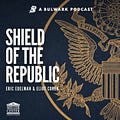While Eliot is still in Europe, Eric welcomes former U.S. Ambassador to Ukraine (1998-2000) Stephen Pifer to the show. Steve is affiliated with the Stanford Center on International Security and Cooperation and is a non-resident fellow at the Brookings Institution. He has served at the US Embassies in Warsaw, Moscow and London, was senior director at the NSC and Deputy Assistant Secretary of State for Russia and Ukraine, as well as an advisor to Amb. Paul Nitze during the INF Treaty negotiations. They discuss VE Day in Europe, the drone attack on the Kremlin, the prospects for the Ukrainian counter-offensive and the types of military equipment that would be most useful for the Ukrainians. They also discuss the promise (or lack thereof) of potential Chinese mediation of the conflict and negotiations between Russia and Ukraine to end the conflict.
https://www.amazon.com/Eagle-Trident-U-S-_Ukraine-Relations-Turbulent/dp/0815730403
Shield of the Republic is a Bulwark podcast co-sponsored by the Miller Center of Public Affairs at the University of Virginia. Email us with your feedback at shieldoftherepublic@gmail.co
Learn more about your ad choices. Visit podcastchoices.com/adchoices












The Next Phase of War